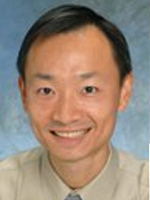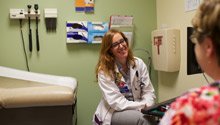
Whether your ultimate career goal is primary care, hospital, or subspecialty medicine, a solid grounding in outpatient medicine will make you a great doctor to your patients. With increasing scrutiny of readmissions, successful hospitalists of the future will need to understand what it takes for patients to thrive in the community. Every medicine subspecialist from pulmonologists to nephrologists to cardiologists spends substantial time in clinic and the skills of a facile outpatient doctor will be useful across subspecialties.
The residency clinic at Providence St Vincent is a well-functioning clinic that serves the entire spectrum of our surrounding community: from Central American/Russian/Korean/Middle Eastern immigrants, to the sub/urban poor, to nursing home/memory care residents, to people with jobs at Nike/Intel. The atmosphere of the clinic is one of collaboration and rapport between residents, attendings, and staff. More importantly, the intentionally longitudinal structure of the clinic fosters deep, meaningful relationships between residents and their patients. Every spring for the 14 years that I have taught at Providence St Vincent (and even during CoVID-19), we have patients making appointments with their graduating third-year...just to say good-bye.
In this spirit, it was natural that the Providence St Vincent Internal Medicine Residency Clinic was selected as one of the first medical homes in Medicare’s primary care innovation projects.
Tom Chau, MD
Director, Providence Medical Group – St. Vincent

Internal medicine residents at Providence St. Vincent Medical Center have
the unique opportunity to learn how to become someone’s primary
care doctor within an inventive medical home clinic model.
The resident clinic was the first internal medicine teaching clinic in
the Providence system to be chosen by the Centers for Medicare and Medicaid
Services to receive a grant and participate in the Comprehensive Primary
Care Initiative (CPCI). This program and its current iteration—Primary
Care First—have inspired innovative thinking which will set the
standard for the future of primary care.
We have used this funding to offer full-time assistance to residents and faculty providers in several support areas which highlight our focus on team-based care:
|
Full-time Professional Clinic Staff |
|
|
|
|
Clinical Experience |
|
|
Intern year |
One half-day/week |
|
Four dedicated weeks of outpatient medicine |
|
|
Patient panel: ~80 patients |
|
|
Second year |
Two half-days/week No clinic during Wards |
|
Eight dedicated weeks of outpatient medicine |
|
|
Patient panel: ~150 patients |
|
|
Third year |
Two half-days/week No clinic during Wards |
|
Twelve dedicated weeks to outpatient medicine |
|
|
Patient panel: ~180 patients |
|

Over three years, a resident in our program builds valuable relationships with clinic patients who know the resident as their primary doctor. This powerful experience—built on intentional scheduling, an excellent clinic support team, and ownership of patient care—maximizes resident education and satisfaction. It is far more rewarding to see your own patients in clinic and witness how your decisions helped them improve over time than to cross-cover one-off visits for other people’s patients.
Most medical graduates come to residency with relatively less outpatient experience than inpatient. To help our interns build confidence in outpatient workflows and knowledge, we have 2+1 scheduling for all categorical interns, that is, two months of inpatient rotations will always be followed by a week of clinic. We aim to have all interns do their first clinic week within the first few months of residency, so they begin to gain the skills and tools to be their patients’ primary doctor.
At the same time, patients are eager to build relationships with their intern PCPs and weekly clinic increases the chances that intern availability intersects with what’s going on in patients’ lives. Once physician-patient relationships have taken root in intern year, it will be easier to care for patients between longer-spaced appointments as a resident leading ward teams.